ASCO2021 Prospect: 8 Tumor immunotherapies from China
- Normal Liver Cells Found to Promote Cancer Metastasis to the Liver
- Nearly 80% Complete Remission: Breakthrough in ADC Anti-Tumor Treatment
- Vaccination Against Common Diseases May Prevent Dementia!
- New Alzheimer’s Disease (AD) Diagnosis and Staging Criteria
- Breakthrough in Alzheimer’s Disease: New Nasal Spray Halts Cognitive Decline by Targeting Toxic Protein
- Can the Tap Water at the Paris Olympics be Drunk Directly?
ASCO2021 Prospect: 8 Tumor immunotherapies from China
ASCO2021 Prospect: 8 Tumor immunotherapies from China. The American Society of Clinical Oncology (ASCO) annual meeting is the world’s top clinical oncology conference that integrates the scale of participation, academic level and authority.
The ASCO annual meeting in 2021 will be held in the form of a virtual meeting. It will be held from June 4th to 8th. Numerous international cutting-edge and high-profile clinical oncology research results and clinical data will be disclosed.
The latest research data and clinical results of many Chinese pharmaceutical companies have also been disclosed in the form of abstracts. Let us have a look on tumor immunotherapy.
1. Tislelizumab (NCT03736889)
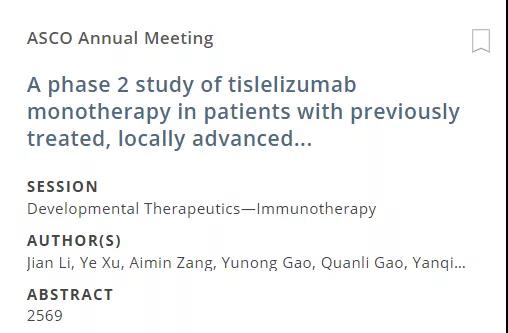
First, let’s look at BeiGene’s tislelizumab. This single-arm, multicenter, open-label Phase 2 study evaluated the efficacy and safety of tislelizumab as a single-agent treatment for Chinese adult patients, all of whom were previously treated. , Locally advanced, unresectable or histologically confirmed metastatic MSI-H/dMMR solid tumor.
From September 2018 to August 2020, a total of 80 patients were enrolled (median age 53 years), of which 74 were included in the main efficacy analysis. At a median follow-up of 11.78 months, the ORR assessed by the Independent Review Committee (IRC) was 45.9% (n=34/74; 95% CI: 34.3-57.9%), including 4 cases of complete remission (CR) and partial remission (PR) ) 30 cases. The ORR of independent imaging assessment of CRC patients was 39.1% (n=18/46; 95% CI: 25.1-54.6%), and the ORR of non-CRC patients was 57.1% (n=16/28; 95% CI: 37.2-75.5 %). Among 74 patients, 53 (71.6%) achieved disease control, and 39 (52.7%) achieved CR, PR or stable disease for ≥24 weeks. The median DoR was not reached; 34 responders (CR+PR) had no report of disease progression, and 33 responders were still on treatment (12-month DoR rate = 100%). The incidence of treatment emergent adverse events (TEAE) ≥3 grade was 47.5% (n=38/80), of which 21.3% (n=17/80) were experimental abnormalities, and immune-mediated TEAEs ≥3 grade were 5% (N=4/80).
Tilelizumab continues its excellent performance. In the previous CSCO2021 version of the guidelines, it became the first Chinese independent research and development PD that was fully recommended by the guidelines in the first and second-line immunotherapy of advanced non-small cell lung cancer (NSCLC). 1 monoclonal antibody. In the first-line treatment of advanced squamous NSCLC, tislelizumab has been recommended as level I, filling many gaps in some countries’s independent research and development of immune checkpoint inhibitors in this field.
2. HLX10 (NCT03941574)
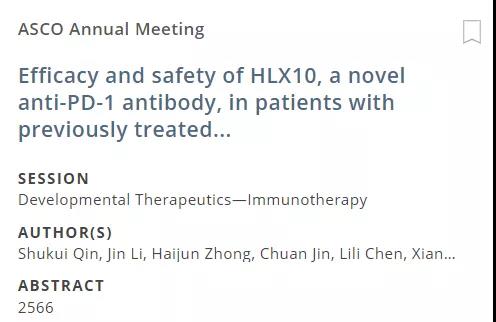
HLX10 is an anti-PD-1 monoclonal antibody developed by Henlius. This is a single-arm, open-label, multi-center phase 2 clinical study. The enrolled patients were confirmed to be unresectable or unresectable by histology/cytology. For metastatic MSI-H/dMMR solid tumors, 3 mg/kg HLX10 was injected intravenously every two weeks for 2 years until disease progression, unacceptable toxicity, or patient withdrawal.
As of January 9, 2021, 108 patients were enrolled, and 68 locally or centrally diagnosed MSI-H patients were included in the main efficacy analysis population. Among the 68 patients, the average follow-up time was 7.7 months (range: 1.1-16.4), and the average age was 53.0 years (range: 23.0-72.0). MSI-H tumor types include colorectal cancer (n=54), endometrial cancer (n=5), gastric cancer (n=4), breast cancer (n=2), small bowel cancer (n=2), and fallopian tube cancer (N=1).
The IRRC and the ORR assessed by the investigator were 38.2% (95%CI: 26.7-50.8%, including 2 CR) and 35.3% (95%CI: 24.1-47.8%), respectively. The median DoR, PFS and OS were not reached. 105 patients (97.2%) experienced therapeutic adverse events (TEAEs), the most common being anemia (34.3%), hypoproteinemia (27.8%) and elevated aspartate aminotransferase (25.0%). 53 patients (49.1%) had grade 3 or worse TEAEs, the most common being anemia (8.3%), progressive disease (6.5%), elevated γ-glutamyltransferase (5.6%) and intestinal obstruction (5.6%). Fifty-two patients (48.1%) had immune-related adverse events (irAEs), and 10 patients (9.3%) had grade 3 or more severe irAEs. Three deaths (2.8%) possibly related to the study drug were reported (2 PD and 1 intestinal obstruction).
3. HX008(NCT03704246)
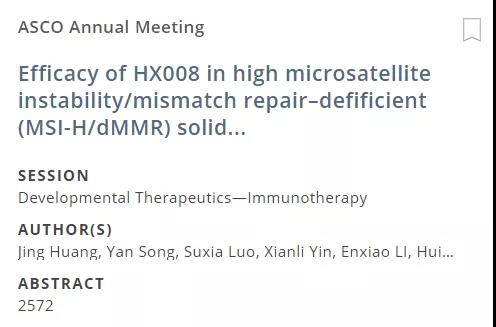
HX008 is an anti-PD-1 monoclonal antibody developed by Taizhou Han Biomedicine. The patients in this phase 2 clinical study are advanced MSI-H/dMMR solid tumors confirmed by histology/cytology, and at least one standard treatment failure. The patient takes HX008 200 mg every 3 weeks until the disease progresses, unacceptable toxicity occurs, or the patient withdraws.
A total of 100 patients were enrolled from October 2018 to December 2020, with an average age of 53 years (20-74 years), and all patients were patients with more than second-line treatment. The most common types of cancer are colorectal cancer (N=74) and gastric cancer (N=10). At the time of data cutoff, the median follow-up time was 8.97 months (range 0.03-25.53). Of the 86 patients, there were 8 cases of CR, 33 cases of PR, 24 cases of SD, 17 cases of progressive disease (PD) and 4 cases of unassessment (NE).
ORR was 47.67% (95%CI: 36.79~58.73%), and DCR was 75.58% (95%CI: 65.13~84.20%). The ORR and DCR of 66 patients with colorectal cancer were 50% (95%CI: 37.43-62.57%) and 75.76% (95%CI: 63.64-85.46%), respectively. The median PFS of all enrolled patients did not reach (95%CI 6.18-NR), and the incidence of PFS at 6 months and 12 months was 62.66% (95%CI: 50.98%-72.31%) and 52.70% (95%). CI: 39.96%-63.94%). The median OS was not reached.
Treatment-related adverse events occurred in 77 patients (77%). Twelve cases (12%) had grade 3 or 4 treatment-related adverse events, and no grade 5 treatment-related adverse events. 3, 4 treatment-related adverse events with an incidence of >1% include anemia (2%) and leukopenia (2%). 15 cases (15%) of immune-related adverse events, including 9 cases of hypothyroidism (all grade 1-2), hepatitis, hyperglycemia, myocarditis, increased creatine kinase/creatine kinase MB, hypopigmentation of vulva, and 1 case of skin rash .
4. MSB2311(NCT04272944)
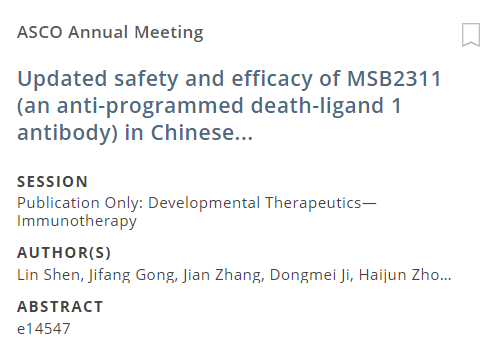
MSB2311 is a new anti-PD-L1 monoclonal antibody developed by Mabbs Biomedicine. It has unique pH-dependent antigen binding properties and can enhance tumor penetration. This phase 1 clinical study mainly evaluates the safety and tolerability of MSB2311 in patients with metastatic solid tumors and specific lymphomas that have progressed after treatment, as well as preliminary anti-tumor activity. In the dose escalation part, MSB2311 was injected intravenously at dose levels of 3, 10, and 20 mg/kg every 3 weeks; in the dose extension part, the dose was 20 mg/kg Q3W or 10 mg/kg Q2W.
As of August 31, 2020, a total of 33 patients have received treatment, including 27 patients with solid tumors who have received multiple treatments and 6 patients with lymphoma. No dose-limiting toxicity was reported, and MTD was not reached. The most common adverse events (>20%) included: anemia, hypothyroidism, elevated aspartate aminotransferase, proteinuria, and weight loss. 13 cases (39.4%) had grade 3 adverse events, 6 cases (18.2%) had serious adverse events, and no treatment-related grade 4 or 5 events were reported.
Among the 17 patients with biomarker-selected solid tumors with evaluable efficacy, the ORR was 35%, of which 6 had PR: 10 mg/kg Q2W had 2/8 (25%), 20 mg/kg Q3W had 4/ 9 (44%). In addition, one patient received continuous iPR through iRECIST. In 4 of the 7 cases (including 1 iPR), the tumor shrank by more than 50%, 3 cases had a durable response of ≥24 weeks, and 1 case of PR in 6 cases of lymphoma.
5. SHR-1701(NCT03710265)
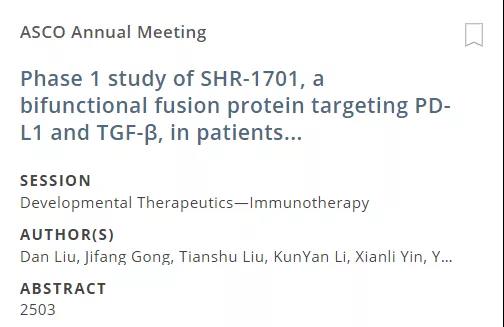
SHR-1701 is a fusion protein of anti-PD-L1 monoclonal antibody and TGF-β Trap developed by Hengrui. The goal of this phase I clinical trial is to evaluate the safety and preliminary resistance of SHR-1701 in patients with refractory solid tumors. Tumor activity. The dose escalation starts at 1 mg/kg Q3W, and then switches to the 3+3 regimen (3, 10, 20, and 30 mg/kg Q3W and 30 mg/kg Q2W).
A total of 17 patients were enrolled in the first phase of the study (1 mg/kg Q3W[n=1]; 3, 10, 20 and 30 mg/kg Q3W[n=3]; 30mg/kg Q2W[n=4]), No DLT was observed and MTD was not reached. Another 32 patients were included in the dose expansion part (10 mg/kg Q3W[n=8]; 20 and 30 mg/kg Q3W[n=9]; 30 mg/kg Q2W[n=6]). Among the 49 registered patients, 33 patients (67.3%) had received ≥2 lines of previous systemic therapy.
As of October 30, 2020, the median duration of exposure to SHR-1701 was 6.0 weeks (range 2.0-78.6). The most common TRAEs are elevated ALT/AST, anemia, hypothyroidism, and elevated bilirubin/conjugated bilirubin, with an incidence of >15%. The researchers reported an incidence of 46.9% of irAEs, and 4 patients received systemic corticosteroid therapy. Hypothyroidism and skin rashes are the most common irAEs, with an incidence of >10%. The incidence of ≥3 grade TRAE was 18.4%, and the incidence of ≥3 grade irAE was 10.2%. One case died early due to liver failure due to tumor progression.
Among the 49 registered patients, 45 patients completed at least one efficacy evaluation. ORR was 17.8% (95%CI: 8.0-32.1%), of which 8 cases achieved PR (2 cases of lung adenocarcinoma, 1 case of HCC, 1 case of ESCC, 1 case of dMMR-CRC, 1 case of renal cancer, 1 case of epiglottic carcinoma) , 1 case of pancreatic acinar cell carcinoma). The DCR was 40.0% (18/45; 95% CI: 25.7-55.7%). Most responders (7/8) are still on treatment, and the median DoR has not yet been reached.
6. IBI110 (NCT04085185)
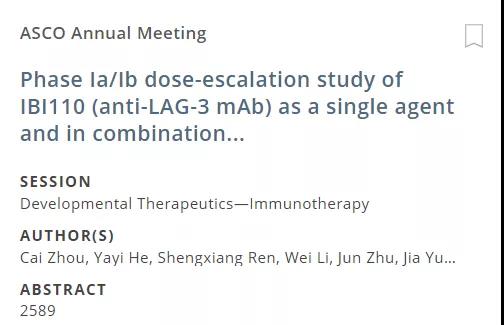
IBI110 is a monoclonal antibody that targets the immune checkpoint LAG-3 developed by Innovent. This phase I clinical trial aims to evaluate the safety and tolerability, pharmacokinetics (PK), and pharmacodynamics of IBI110 (PD) and the anti-tumor activity of monotherapy or in combination with sintilimab (anti-PD-1).
The selected patients have ECOG PS 0-1, with locally advanced, recurring or metastatic solid tumors, and standard treatments have failed. Patients in stage Ia receive an increasing dose of IBI110 (0.01/0.1/0.3/1/3/10/20mg/kg) intravenous Q3W, and patients in stage Ib receive an increasing dose of IBI110 (0.3/0.7/1.5/3/5mg/kg). kg) combined with 200mg sintilimab intravenous injection of Q3W.
21 patients were enrolled in stage Ia (median age: 62 years [range 43-72]; ECOG PS: 0[n=11], 1[n=10]). No dose limiting toxicity was observed in all dose groups ( DLT). The most common treatment-related adverse event (TRAE) was anemia (19.0%). TRAEs of grade ≥3 included anemia (4.8%), ascites (4.8%), and abnormal liver function (4.8%).
The best effect of monotherapy is 1 case of confirmed partial remission (PR) (ovarian cancer, 3mg/kg IBI110) and 5 cases of stable disease (SD). After switching from monotherapy to combination therapy in the advanced stage, SD was observed in 5 patients.
Twelve patients were enrolled in stage Ib (median age: 60 years [range 33-72]; ECOG PS: 0[n=7], 1[n=5]). Except for IBI110 5mg/kg+sintilimab, no DLT was observed in all the escalating dose groups. The most common TRAE is an increase in AST (41.7%). TRAEs of grade ≥3 included hyperglycemia (8.3%), elevated conjugated bilirubin (8.3%), and abnormal liver function (8.3%). The best response was 2 cases of PR (small cell lung cancer and endometrial cancer) and 6 cases of SD.
7. LBL007(CTR20210196)
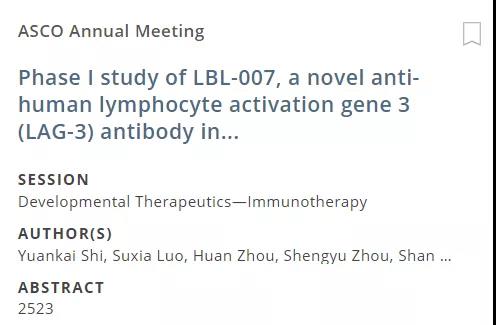
LBL007 is a monoclonal antibody that targets the immune checkpoint LAG-3 developed by Nanjing Weilizhibo. This multi-center, open-label phase 1 clinical trial evaluates the safety and tolerability of LBL007 in patients with advanced solid tumors. Sex and PK. In the dose escalation phase, 6 dose groups of LBL-007 were used, with doses of 0.05, 0.25, 1, 3, 6 and 10 mg/kg (intravenous injection every 2 weeks), and a modified 3+3 design was adopted. The main inclusion criteria include: age ≥18 years, histological/cytological confirmation of advanced solid tumor, failure of previous standard treatment of more than 2 lines, ECOG of 0-1, and good blood, kidney, liver, and heart functions.
From March 12, 2020 to February 9, 2021, 17 patients were evaluated. There were no dose-limiting toxicities (DLTs) in any dose group, and the patients were well tolerated. In total, there were 129 adverse events (AEs), 8 were serious adverse events (SAE), 5 of which were suspected accidental serious adverse reactions (SUSAR), but most were unlikely to be treatment-related adverse events (TRAEs). The most common adverse events were anemia (14, 10.9%), hypocalcemia (6, 4.7%) and thrombocytopenia (4, 3.1%).
A total of 8 patients had no disease progression, defined as SD at the first assessment, lasting 3.5-9 months. In 8 cases, 2 cases of tumors were reduced by 18.9% and 23.2% (both esophageal cancer). The progression-free survival of these 2 patients were 4.4 months and 9.0 months.
Patients were also included in the indication exploration phase (3 and 6 mg/kg), and combined treatment with anti-PD-1 antibodies was tested in patients with melanoma and other solid tumors.
8. IMM01 (ChiCTR1900024904)
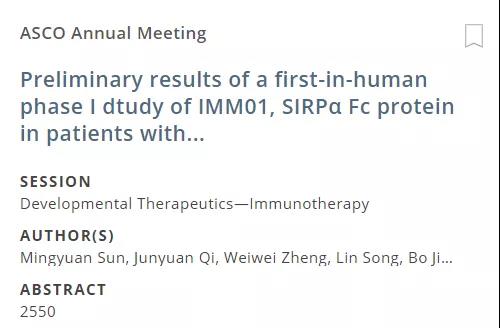
IMM01 is a fusion protein of SIRPa and FC that targets CD47 developed by ImmuneOnco. This phase 1 clinical study evaluated the safety and tolerability of IMM01 in patients with relapsed or refractory lymphoma who failed standard treatment Sex, and the situation of PK and PD.
As of February 8, 2021, a total of 14 patients (median age 49 years old, after an average of more than 3 treatments) were enrolled in 6 increasing dose groups (0.003 mg/kg, 0.01 mg/kg, 0.05 mg/kg, 0.15 mg/kg, 0.5 mg/kg and 1.0 mg/kg). Common tumor types are follicular lymphoma, Hodgkin’s lymphoma, and diffuse large B-cell lymphoma.
No DLT was observed below 1.0 mg/kg. One SAE (increased grade 2 amylase and elevated grade 3 lipase) was caused by the progression of pancreatic disease. The most common treatment-related adverse events were thrombocytopenia (54%), decreased neutrophil count (36%), fever (36%), and anemia (27%). Most of them were grade 1 or 2, but one patient had a grade 3 platelet count drop. The transient platelet count dropped 2 hours later and returned to baseline levels 24 to 48 hours after the first infusion. Among the 12 patients evaluated, 1 FL patient developed CR and maintained it for 26 weeks at a dose of 0.01 mg/kg. One HL patient whose PD-1 inhibitor failed was identified as PR at 27 weeks and continued treatment, and one MZL patient maintained SD at a dose of 0.15 mg/kg for 12 weeks. One HL patient who failed PD-1 inhibitor treatment and one FL patient had a continuous decrease in SD for 12 weeks at a dose of 0.5 mg/kg. An AITL patient was evaluated as SD after receiving 5 treatments at a dose of 1.0 mg/kg.
The terminal half-life of IMM01 is between 53.8 hours and 73.3 hours. The AUC and Cmax of IMM01 showed a non-linear increase in the dose range of 0.05 mg/kg to 0.5 mg/kg.
(source:internet, reference only)
Disclaimer of medicaltrend.org



